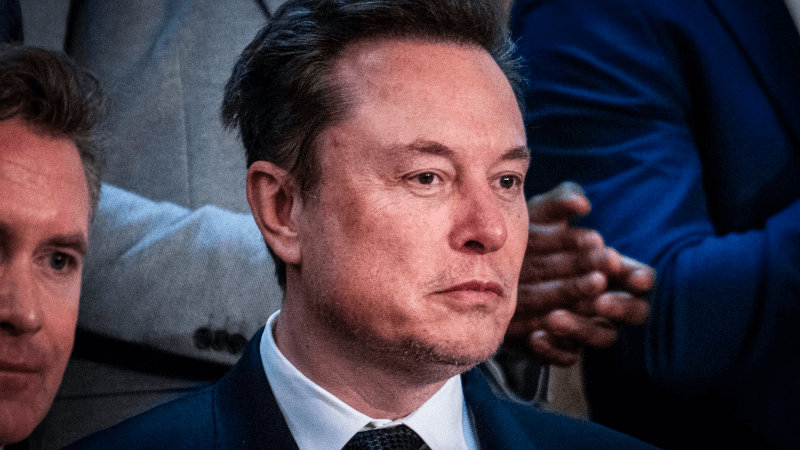Elon Musk, MSNBC Purchase Rumors, and Rachel Maddow’s Viral Video: The Real Story Behind the Controversy

In a time where social media influences public opinion in minutes, a viral video of MSNBC’s Rachel Maddow has become the most recent hot issue. Widely posted on X (previously Twitter), the footage claims to show Maddow dissecting live on air over Elon Musk’s memes and speculations regarding his acquisition of MSNBC. The actual story, however, shows a considerably more convoluted tale concerning media manipulation, false information, and the difficulties confronting established news sources.
Elon Musk, the billionaire businessman and X owner who is well-known for his colorful and sometimes divisive postings, is at the core of the debate. Musk most recently uploaded a meme labeled, “And lead us not into temptation…” The picture showed a woman exposing herself while a priest branded “Elon Musk trying not to buy” looks away in seeming restraint. With the MSNBC logo on her image, the woman said Musk was inclined to buy the network.
Though Musk’s post attracted notice right away, it wasn’t simply the meme that made news. Claims that Rachel Maddow had an emotional breakdown live on air in response to Musk’s actions exploded on social media, igniting a rush of responses, ridicule, and argument.
Social Media Reaction and Hypothesis
Social media users were fast to load on the doctored footage with overdone commentary. One post I came upon: “Drama queen extraordinaire, Rachel Maddow, cries over a meme on national TV when she realises Elon could become her boss.” “She’s crying because she knows her cash flow is running out,” another person said.
Others adopted a more sarcastic attitude, implying that Maddow’s stay at MSNBC would be limited should Musk buy MSNBC. One reply said, “No, he won’t be her boss; he will sack her.” ” Rachel MadCow paid $30 million annually to perform one-hour shows every week!” commented another. It dropped recently to $25 million annually. Go shed me a river, Rachel!
Some even thought of the circumstances as Musk’s call to action. One commenter exhorted, “He’s gotta buy it now,” while another chipped in, “She knows her days are numbered if this happens.”
The Viral Video
Several users intervened among the frenzy to straighten things out. Neither Musk nor the speculations about MSNBC’s future connected the viral video of Maddow breaking down. Actually, the video started with a 2018 program in which Maddow became distraught covering migrant children being taken from their homes and housed in shelters. Her tears were a real response to a humanitarian issue, not Musk’s meme or alleged curiosity in MSNBC.
One commenter explained, offering a link to the original footage, “It’s fake… a doctored video of this.” Notwithstanding this disclosure, the edited movie kept becoming popular since it emphasized the need for false information in the media scene of today.
Musk’s meme and the popular video coincided with a period of alleged examination of MSNBC’s future. The parent firm of MSNBC, Comcast, is reportedly looking at merging its cable networks—including MSNBC and CNBC—into a new company known as SpinCo. This possible reorganization begs issues regarding the long-term survival of established news sources in a media landscape changing quickly.
Musk’s participation, albeit just hypothetical at this point, has heightened the fascination. Renowned for his efforts into many fields, from social networking to electric cars, Musk’s alleged interest in MSNBC fits his tendency of upsetting established sectors. About any possible acquisition, though, Musk or Comcast has not confirmed.
Rachel Maddow’s Place in a Changing Media Scene
One of MSNBC’s most well-known personalities, Rachel Maddow is still fundamental to the network’s ethos. Even with a $5 million pay cut—that brings her annual income to $25 million for the next five years—Maddow still attracts a sizable audience. Her change to a weekly schedule has let her concentrate on in-depth reporting and other artistic endeavors, but the future of MSNBC looms huge and is unknown.
Originally aired in 2018, Maddow’s original show is now edited into a viral video that highlights her reputation for confronting emotionally difficult subjects. It also emphasizes the difficulties public personalities experience in a time when false information may travel quickly and skew their behavior and intentions.
Problems for MSNBC and the Trump Effect
Reportedly down 40% from the same period last year, MSNBC is struggling with dwindling numbers. Executives looking for means to grab the interest of their audience have been left behind this decline. Like in his first term, some experts think a possible Donald Trump presidency in 2024 may revive viewers.
The difficulties of the network mirror more general problems traditional media faces at a time when social media and streaming services rule. Whether real or not, rumors about Musk’s interest in MSNBC just heighten the uncertainty.
Fundamentally, this debate brings attention to how memes and viral content shape public narratives. Though apparently lighthearted, Musk’s remark set off a flurry of rumors, false information, and argument. The event reminds Maddow of the dangers public personalities run in a digital age when their behavior could be distorted or taken out of context.
For Musk, the circumstances emphasize his capacity to control headlines and start a discussion even in sectors he has not yet entered. Though his impact on the story of MSNBC is indisputable, it is yet unclear whether he ever gives real thought to owning MSNBC.
The viral Rachel Maddow video and the speculations about Elon Musk’s interest in MSNBC have produced a perfect storm of false information, parody, and conjecture. Although the truth about the video has been revealed, the story highlights the difficulties traditional media has, the part social platforms play in influencing public opinion, and the ongoing capacity of leaders such as Musk to subvert accepted wisdom.




